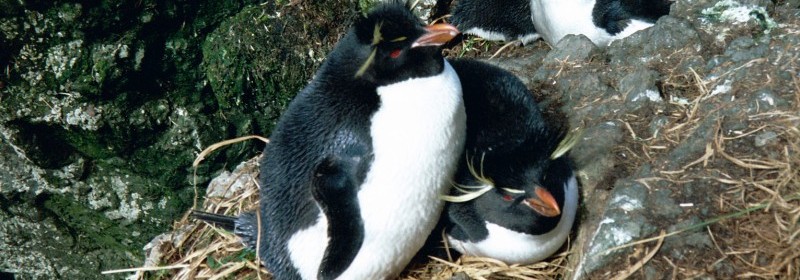Climate risk to inflexible penguins’ chicks

Crested and rockhopper penguins are threatened by climate change – but this time the penguins could be at risk because they cannot change their own ways.
Evolution has left them with a rigid parenting strategy, probably well adapted for climate conditions so far. But as temperatures rise, conditions change and food supplies become precarious, the inflexible roles of male and female members of the Eudyptes genus may mean that male and female rockhoppers could be in the wrong place at the wrong time, and fail to feed their chicks.
Kyle Morrison of Massey University in New Zealand and colleagues report in the journal Behavioral Ecology and Sociobiology that they observed eastern rockhopper penguins, Eudyptes chrysocome filholi, over two consecutive breeding seasons on Campbell Island, in the sub-Antarctic.
They chose the colony because they could reliably record feeding trips along a narrow 200-metre pathway from breeding colony to the sea, and identify which individual went off to look for food for the hatchlings.
Twin duties
Climate change doesn’t necessarily damage the chances of survival for a species. Although Magellanic penguin colonies in Argentina are finding the changing weather patterns a challenge, Adélie penguins on the Antarctic peninsula seem for the moment to be thriving, while the Emperor penguin could be threatened with long-term decline.
Rockhoppers, like all penguin parents, have two responsibilities: to protect their young from predators and intruders, and to go to sea to gather food for them. Most penguin species tend to alternate responsibilities so that neither parent goes hungry for too long.
But in all seven species of Eudyptes, the roles and regimes are inflexible. Males go hungry and stand guard for the first three to four weeks, while females are the sole providers. Over the next six weeks the chicks gather in creches and can be fed by both parents, and during this time both sexes may take to the sea for several days to put on weight again.
The scientists recorded each meal for the hatchlings, each absence by a parent, the weight gain by each chick, and the overall success in breeding. In 2011, food was abundant. In 2012, the researchers observed that the krill, fish and squid were scarcer.
Growth slowed
In 2012, during the crèche phase, males of the species spent more time at sea in search of food to put on the weight they had lost: this made it less likely they would return to feed their young. Chicks fed less grew more slowly.
The scientists calculated that, if the Eudyptes penguins shared guarding and foraging duties equally, they might have got a third more food back to their fledglings. But their arrangements remained unchanged, possibly because females, being smaller and less aggressive than males, would be less effective as guardians when the chicks were most vulnerable.
The message is: as climates change, and the patterns of food supply become disrupted, the rockhoppers and crested penguins could begin the slide to extinction.
“Eudyptes penguins, ostensibly anchored to a reproductive strategy maladapted to a marine environment where food availability is less predictable, will continue to be highly threatened by climate change,” says Morrison.
Source: CNN

 Print
Print